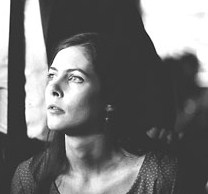This is Joni Mitchell talking about a friend of hers:
Debbie Green and I have become really good friends over the years. She was from Detroit, a friend of Chuck Mitchell [where I get my Mitchell moniker]. Debbie Green was a folk singer. In Berkley she taught Joan Baez how to sing and play the guitar. So Joan Baez, when she sings, she plays Debbie Green. She’s not herself onstage.She has taken Debbie’s persona. Debbie in her passive way gave up and let Joan have it. Joan kind of stole her soul and impersonated it.
This is not the only place this charge surfaces. I’m re-reading the wonderful Baby, Let Me Follow You Down, by Jim Rooney and Eric Von Schmidt, and there’s a great deal of Debbie Green talking about Baez appropriating her identify in that book. When they met as freshmen at Boston University, as the folk boom was getting underway, Green says Baez knew “two chords.”

Debbie Green, in her folk years. She never recorded an album, despite some claims that she was a better singer than Joan Baez.
There’s a picture in the book of the two of them on the beach (with Baez’ sister Mimi, who later married Richard Farina) and Baez is intensely following Green’s hands. The way the book tells it, Baez was ambitious and Green wasn’t. One took of into stardom, and the other watched her repertoire and her arrangements get hijacked.
“Joanie had taken my whole trip,” Green says in the book, “and by her second record I was a Joan Baez imitator. I hadn’t naturally evolved to a place that was more distinctive than that.”
According to the Green Man, “Green had the misfortune to be sick for a couple of months and when she reappeared in the Boston folk clubs, she found that Joan had copied her repertoire down to the last nuance. Baez, when confronted, said, ‘I didn’t hurt her. I only helped myself.'”
Don’t that beat all? Green then married folksinger Eric Andersen, and that proved disastrous for her career, too, because he was jealous and “didn’t like it when I played guitar.” The only recorded evidence that Debbie Green even exists as a musician is a few tunes on Andersen’s early albums in which she plays second guitar. Her name is frequently misspelled, and there’s not much of a trail on the Internet (though she reportedly lives in California now).
This story maybe says something about pre-feminist America. I’m still amazed that the Geoff and Maria Muldaur (to name two other Cambridge folk graduates) record Sweet Potatoes has only two vocals from Maria, one of the finest singers on the planet. But the sexist assumptions of the era didn’t seem to slow Baez down much.
Maybe it says more about ambition or the lack of it. Green may have been overshadowed anyway; as Mitchell notes, she’s a “passive” person. Bob Dylan got his material from everybody and everywhere, including Eric Von Schmidt (the aforementioned “Baby, Let Me Follow You Down”). Some people are tough, and others aren’t. Can you imagine anyone stealing Joni Mitchell’s identity?
I for one would love to hear a Debbie Green (Andersen) record. Why doesn’t she make one now?
For more on the whole Cambridge folk years, check out another ace book, David Hadju’s Positively Fourth Street: The Lives and Times of Joan Baez, Bob Dylan, Mimi Baez Farina and Richard Farina, published in 2001. The Rooney/Von Schmidt book is harder to find these days, but you can get it on Amazon.